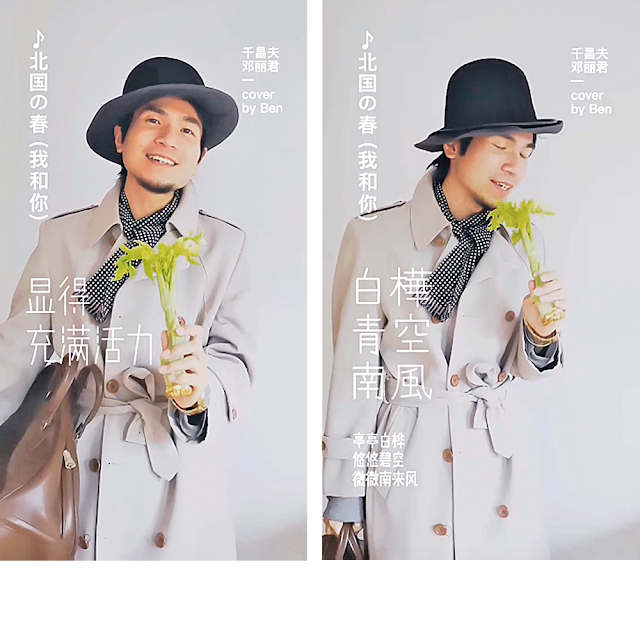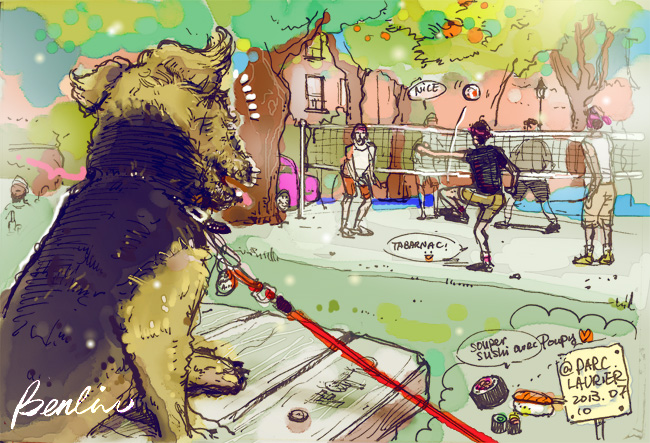SONG of VOGUE | 001 ⎯ 北国の春 (我和你)
北国の春 ("Kitaguni no Haru") ⎯ The Spring of Northern Land
Many years later, as a foreign student in Canada, I was traveling in Toronto, it happened to have this memorial singing contest of Teresa Teng. As a fan, I was like "oh, it'd be fun to win the T-shirt or memorial fan goodies of her", so I signed in the application without really serious intention on the singing part. the chosen song was つぐない ("Tsugunai"). When the contest day arrived, my friend suddenly suggested to me:" What about 'Kitaguni no Haru'? You should sing this instead! "So without any rehearsal of it, I went on the stage " White birch, blue sky, Southern breeze..." Was it a message from the universe? Guess what, I won the finalist.
This Japanese hit 演歌 (Enka Song, a bit like Fado? ) originally sung by Sen Masao in 1977, also sung by Teresa Teng in both Japanese and Chinese in 1979, then became a bit hit all over Asian. "... Enka becomes linked with class culture: what are considered working-class excesses of emotion, melodrama, formula-driven expressions, and gender constructions. Also linked with generational culture: older adult culture's reification of past values, expressions, and gender roles. Other linkages with regional culture: a constructed sense of rural culture as harbinger of old-fashioned, conservative ways and ideas. Yet Enka's production centers lie in the cities of Japan, especially Tokyo, and many of its urban fans avidly consume Enka as a nostalized form of rurality, as an aural, emotional, national-cultural rootedness." (Men and Masculinities in Contemporary Japan: Dislocating the Salaryman Doxa By James E. Roberson, Nobue Suzuki )
So 北国の春 is about a nostalgic exiled farmer from Northern town, missing his hometown in the big city, where he works. (Dah! 😝 ) Japan was a big economically developed country at that time, also the biggest music industry in Asia, the second biggest one in the world (Ah the Belle Époque of Karaoke). Lots of farmers from the Northern towns of Japan such as 北海道 (Hokkaido) came to big economic cities as 東京 (Tokyo) to looking for jobs.
The Chinese version is more about a love story of a couple, who send their grateful Thank-you messages to the loved one.
Here I'm singing in two languages, hope you enjoy it as much as I enjoy singing it!
Which version you prefer ?
 |
Conceptual LP cover |
 |
Conceptual LP cover design / Video / Sing ⎮ Ben Liu
Style ⎮ vintage beige trench coat : Croydon
black & white polka-dot scarf : Dfly
Golden watch : TicToc
Gray crushable wool Hat : Simons
Black wool melon hat : Gap |
⎯⎯⎯⎯⎯⎯⎯⎯⎯⎯⎯⎯⎯⎯⎯⎯⎯⎯⎯⎯⎯⎯⎯⎯⎯⎯⎯⎯⎯⎯⎯⎯⎯⎯⎯⎯⎯⎯⎯
SING WITH ME
⎯⎯⎯
北国の春 + 我和你
詞:いではく/ 林煌坤 曲:遠藤実
白(しら)樺(かば) 青(あお)空(ぞら)
南(みなみ)風(かぜ)
こぶし咲(さ)くあの丘(おか)
北国(きたぐに)の
ああ,北国(きたぐに)の春(はる)
季(き)節(せつ)が都(と)会(かい)では
分(わ)からないだろうと
届(とど)いたおふくろの
小(ちい)さな包(つつ)み
あの故郷(ふるさと)へ
帰(かえ)ろかな
帰(かえ)ろかな
| White birch, blue sky, southern breeze, The magnolias blooms on the hill, ah, it's spring of the North Land! You won't feel the seasons in the big city A small package arrived from Mom. Shall I return home ? Shall I ? |
我衷心地謝謝你, (Wǒ zhōngxīn de xièxiè nǐ) 一番關懷和情意。 (yī fān guānhuái hé qíngyì) 如果沒有你, (Rúguǒ méiyǒu nǐ) 給我愛的滋潤, (gěi wǒ ài de zīrùn) 我的生命將會失去意義。 (wǒ de shēngmìng jiāng huì shīqù yìyì) 我們在春風裡陶醉飄逸, (Wǒmen zài chūnfēng lǐ táozuì piāoyì) 仲夏夜裡綿綿細語。 (zhòngxià yèlǐ miánmián xì yǔ) 聆聽那秋蟲它輕輕在呢喃, (Língtīng nà qiū chóng tā qīngqīng zài ní nán) 迎雪花飄滿地。 (yíng xuěhuā piāo mǎn dì) 我的平凡歲月裡, (Wǒ de píngfán suìyuè lǐ) 有了一個你, (yǒule yīgè nǐ) 顯得充滿活力。 (xiǎndé chōngmǎn huólì) | I'd like to thank you sincerely, for your caring and love, without your love, my life would be meaningless, We float in the spring breeze, Whisper in the summer night, Listening to the harvest fly, Lying in the sonwy winter. My normal life with you, becomes vivid and energetic. |
山吹(やまぶき) 朝雾(あさぎり)
水(すい)車(しゃ)小屋(ごや)
わらべ唄(うた)闻(き)こえる
北国(きたぐに)の
ああ,北国(きたぐに)の春(はる)
兄貴(あにき)も親父(おやじ)似(に)で
無(む)口(くち)な二人(ふたり)が
たまには酒(さけ)でも
飲(の)んでるだろうか
あの故郷(ふるさと)へ
帰(かえ)ろかな
帰(かえ)ろかな
| Miracle marigold bushes, morning mist, watermill A children's song ah, the spring of North Land. My father and elder brother, sitting silently Are these two having drinks once in a while? Shall I return home ? Shall I ?" |
⎯⎯⎯
ORIGINALS
art direction + illustration ⎮ benliubenda.com








Comments
Post a Comment
Thank you for your comments :)